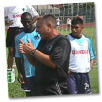Some Good Thoughts
The following quotes are from the The Art of Learning – A Journey In The Pursuit of Excellence by Josh Waitzkim
“ The key is relaxed hip joints and spring-like body mechanics, so you can easily receive force by coiling it down through your structure.” P109
“Our obstacle is that we live in an attention deficit culture. We are bombarded with more and more information on television, radio, cell phones, video games, and the internet. The constant supply of stimulus has potential to turn us into addicts, always hungering for something new and prefabricated to keep us entertained. When nothing exciting is going on, we might get bored, distracted, separated from the moment. So we look for new entertainment, surf channels, flip through magazines. If caught in these rhythms, we are like tiny current- bound surface fish, floating along a two-dimensional world without any sense for the gorgeous abyss below. When these societally induced tendencies translate into the learning process, the have a devastating effect.” p 116
“Everyone races to learn more and more, but nothing is done deeply, Things look pretty but they are superficial, without a sound body mechanic or a principled foundation. Nothing is learned at a high level and what results are form collectors with fancy kicks and twirls that have absolutely no martial value.” P117
“One thing I have learned as a competitor is that there are clear distinctions between what it takes to be decent, what it takes to be good, what it takes to be great and what it takes to be among the best.” P132
“Over time each chess principle loses rigidity, and you get better and better at reading the subtle signs of qualitative relativity. Soon enough, learning becomes unlearning. The stronger chess player is often one who is less attached to a dogmatic interpretation of the principles. This leads to a whole new layer of principles – those that consist of the exceptions to the initial principles.” P141


2 Comments:
Josh is obviously one of the people who gets it.
Some teachers rebel so far away from being authoritarian that they praise all their little player's decisions, good and bad. Their intention is to build confidence, but instead they discourage objectivity, encourage self-indulgence and perhaps most destructively, they create a dishonest relationship between instructor and pupil that any bright child can see. pg 10
Post a Comment
<< Home